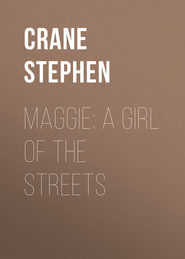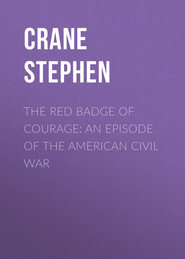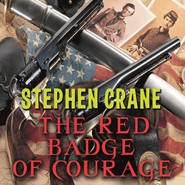По всем вопросам обращайтесь на: info@litportal.ru
(©) 2003-2025.
✖
The Little Regiment, and Other Episodes of the American Civil War
Настройки чтения
Размер шрифта
Высота строк
Поля
He and the man on the other end of the trunk thoughtfully talked of the army's position. To their minds, infantry and artillery were in a most precarious jumble in the streets of the town; but they did not grow nervous over it, for they were used to having the army appear in a precarious jumble to their minds. They had learned to accept such puzzling situations as a consequence of their position in the ranks, and were now usually in possession of a simple but perfectly immovable faith that somebody understood the jumble. Even if they had been convinced that the army was a headless monster, they would merely have nodded with the veteran's singular cynicism. It was none of their business as soldiers. Their duty was to grab sleep and food when occasion permitted, and cheerfully fight wherever their feet were planted until more orders came. This was a task sufficiently absorbing.
They spoke of other corps, and this talk being confidential, their voices dropped to tones of awe. "The Ninth"—"The First"—"The Fifth"—"The Sixth"—"The Third"—the simple numerals rang with eloquence, each having a meaning which was to float through many years as no intangible arithmetical mist, but as pregnant with individuality as the names of cities.
Of their own corps they spoke with a deep veneration, an idolatry, a supreme confidence which apparently would not blanch to see it match against everything.
It was as if their respect for other corps was due partly to a wonder that organisations not blessed with their own famous numeral could take such an interest in war. They could prove that their division was the best in the corps, and that their brigade was the best in the division. And their regiment—it was plain that no fortune of life was equal to the chance which caused a man to be born, so to speak, into this command, the keystone of the defending arch.
At times Dan covered with insults the character of a vague, unnamed general to whose petulance and busy-body spirit he ascribed the order which made hot coffee impossible.
Dan said that victory was certain in the coming battle. The other man seemed rather dubious. He remarked upon the fortified line of hills, which had impressed him even from the other side of the river. "Shucks," said Dan. "Why, we–" He pictured a splendid overflowing of these hills by the sea of men in blue. During the period of this conversation Dan's glance searched the merry throng about the dancer. Above the babble of voices in the street a far-away thunder could sometimes be heard—evidently from the very edge of the horizon—the boom-boom of restless guns.
III
Ultimately the night deepened to the tone of black velvet. The outlines of the fireless camp were like the faint drawings upon ancient tapestry. The glint of a rifle, the shine of a button, might have been of threads of silver and gold sewn upon the fabric of the night. There was little presented to the vision, but to a sense more subtle there was discernible in the atmosphere something like a pulse; a mystic beating which would have told a stranger of the presence of a giant thing—the slumbering mass of regiments and batteries.
With tires forbidden, the floor of a dry old kitchen was thought to be a good exchange for the cold earth of December, even if a shell had exploded in it, and knocked it so out of shape that when a man lay curled in his blanket his last waking thought was likely to be of the wall that bellied out above him, as if strongly anxious to topple upon the score of soldiers.
Billie looked at the bricks ever about to descend in a shower upon his face, listened to the industrious pickets plying their rifles on the border of the town, imagined some measure of the din of the coming battle, thought of Dan and Dan's chagrin, and rolling over in his blanket went to sleep with satisfaction.
At an unknown hour he was aroused by the creaking of boards. Lifting himself upon his elbow, he saw a sergeant prowling among the sleeping forms. The sergeant carried a candle in an old brass candlestick. He would have resembled some old farmer on an unusual midnight tour if it were not for the significance of his gleaming buttons and striped sleeves.
Billie blinked stupidly at the light until his mind returned from the journeys of slumber. The sergeant stooped among the unconscious soldiers, holding the candle close, and peering into each face.
"Hello, Haines," said Billie. "Relief?"
"Hello, Billie," said the sergeant. "Special duty."
"Dan got to go?"
"Jameson, Hunter, McCormack, D. Dempster. Yes. Where is he?"
"Over there by the winder," said Billie, gesturing. "What is it for,
Haines?"
"You don't think I know, do you?" demanded the sergeant. He began to pipe sharply but cheerily at men upon the floor. "Come, Mac, get up here. Here's a special for you. Wake up, Jameson. Come along, Dannie, me boy."
Each man at once took this call to duty as a personal affront. They pulled themselves out of their blankets, rubbed their eyes, and swore at whoever was responsible. "Them's orders," cried the sergeant. "Come! Get out of here." An undetailed head with dishevelled hair thrust out from a blanket, and a sleepy voice said: "Shut up, Haines, and go home."
When the detail clanked out of the kitchen, all but one of the remaining men seemed to be again asleep. Billie, leaning on his elbow, was gazing into darkness. When the footsteps died to silence, he curled himself into his blanket.
At the first cool lavender lights of daybreak he aroused again, and scanned his recumbent companions. Seeing a wakeful one he asked: "Is Dan back yet?"
The man said: "Hain't seen 'im."
Billie put both hands behind his head, and scowled into the air. "Can't see the use of these cussed details in the night-time," he muttered in his most unreasonable tones. "Darn nuisances. Why can't they–" He grumbled at length and graphically.
When Dan entered with the squad, however, Billie was convincingly asleep.
IV
The regiment trotted in double time along the street, and the colonel seemed to quarrel over the right of way with many artillery officers. Batteries were waiting in the mud, and the men of them, exasperated by the bustle of this ambitious infantry, shook their fists from saddle and caisson, exchanging all manner of taunts and jests. The slanted guns continued to look reflectively at the ground.
On the outskirts of the crumbled town a fringe of blue figures were firing into the fog. The regiment swung out into skirmish lines, and the fringe of blue figures departed, turning their backs and going joyfully around the flank.
The bullets began a low moan off toward a ridge which loomed faintly in the heavy mist. When the swift crescendo had reached its climax, the missiles zipped just overhead, as if piercing an invisible curtain. A battery on the hill was crashing with such tumult that it was as if the guns had quarrelled and had fallen pell-mell and snarling upon each other. The shells howled on their journey toward the town. From short-range distance there came a spatter of musketry, sweeping along an invisible line, and making faint sheets of orange light.
Some in the new skirmish lines were beginning to fire at various shadows discerned in the vapour, forms of men suddenly revealed by some humour of the laggard masses of clouds. The crackle of musketry began to dominate the purring of the hostile bullets. Dan, in the front rank, held his rifle poised, and looked into the fog keenly, coldly, with the air of a sportsman. His nerves were so steady that it was as if they had been drawn from his body, leaving him merely a muscular machine; but his numb heart was somehow beating to the pealing march of the fight.
The waving skirmish line went backward and forward, ran this way and that way. Men got lost in the fog, and men were found again. Once they got too close to the formidable ridge, and the thing burst out as if repulsing a general attack. Once another blue regiment was apprehended on the very edge of firing into them. Once a friendly battery began an elaborate and scientific process of extermination. Always as busy as brokers, the men slid here and there over the plain, fighting their foes, escaping from their friends, leaving a history of many movements in the wet yellow turf, cursing the atmosphere, blazing away every time they could identify the enemy.
In one mystic changing of the fog as if the fingers of spirits were drawing aside these draperies, a small group of the grey skirmishers, silent, statuesque, were suddenly disclosed to Dan and those about him. So vivid and near were they that there was something uncanny in the revelation.
There might have been a second of mutual staring. Then each rifle in each group was at the shoulder. As Dan's glance flashed along the barrel of his weapon, the figure of a man suddenly loomed as if the musket had been a telescope. The short black beard, the slouch hat, the pose of the man as he sighted to shoot, made a quick picture in Dan's mind. The same moment, it would seem, he pulled his own trigger, and the man, smitten, lurched forward, while his exploding rifle made a slanting crimson streak in the air, and the slouch hat fell before the body. The billows of the fog, governed by singular impulses, rolled between.
"You got that feller sure enough," said a comrade to Dan. Dan looked at him absent-mindedly.
V
When the next morning calmly displayed another fog, the men of the regiment exchanged eloquent comments; but they did not abuse it at length, because the streets of the town now contained enough galloping aides to make three troops of cavalry, and they knew that they had come to the verge of the great fight.
Dan conversed with the man who had once possessed a horse-hair trunk; but they did not mention the line of hills which had furnished them in more careless moments with an agreeable topic. They avoided it now as condemned men do the subject of death, and yet the thought of it stayed in their eyes as they looked at each other and talked gravely of other things.
The expectant regiment heaved a long sigh of relief when the sharp call: "Fall in," repeated indefinitely, arose in the streets. It was inevitable that a bloody battle was to be fought, and they wanted to get it off their minds. They were, however, doomed again to spend a long period planted firmly in the mud. They craned their necks, and wondered where some of the other regiments were going.
At last the mists rolled carelessly away. Nature made at this time all provisions to enable foes to see each other, and immediately the roar of guns resounded from every hill. The endless cracking of the skirmishers swelled to rolling crashes of musketry. Shells screamed with panther-like noises at the houses. Dan looked at the man of the horse-hair trunk, and the man said: "Well, here she comes!"
The tenor voices of younger officers and the deep and hoarse voices of the older ones rang in the streets. These cries pricked like spurs. The masses of men vibrated from the suddenness with which they were plunged into the situation of troops about to fight. That the orders were long-expected did not concern the emotion.
Simultaneous movement was imparted to all these thick bodies of men and horses that lay in the town. Regiment after regiment swung rapidly into the streets that faced the sinister ridge.
This exodus was theatrical. The little sober-hued village had been like the cloak which disguises the king of drama. It was now put aside, and an army, splendid thing of steel and blue, stood forth in the sunlight.
Even the soldiers in the heavy columns drew deep breaths at the sight, more majestic than they had dreamed. The heights of the enemy's position were crowded with men who resembled people come to witness some mighty pageant. But as the column moved steadily to their positions, the guns, matter-of-fact warriors, doubled their number, and shells burst with red thrilling tumult on the crowded plain. One came into the ranks of the regiment, and after the smoke and the wrath of it had faded, leaving motionless figures, every one stormed according to the limits of his vocabulary, for veterans detest being killed when they are not busy.
The regiment sometimes looked sideways at its brigade companions composed of men who had never been in battle; but no frozen blood could withstand the heat of the splendour of this army before the eyes on the plain, these lines so long that the flanks were little streaks, this mass of men of one intention. The recruits carried themselves heedlessly. At the rear was an idle battery, and three artillerymen in a foolish row on a caisson nudged each other and grinned at the recruits. "You'll catch it pretty soon," they called out. They were impersonally gleeful, as if they themselves were not also likely to catch it pretty soon. But with this picture of an army in their hearts, the new men perhaps felt the devotion which the drops may feel for the wave; they were of its power and glory; they smiled jauntily at the foolish row of gunners, and told them to go to blazes.
The column trotted across some little bridges, and spread quickly into lines of battle. Before them was a bit of plain, and back of the plain was the ridge. There was no time left for considerations. The men were staring at the plain, mightily wondering how it would feel to be out there, when a brigade in advance yelled and charged. The hill was all grey smoke and fire-points.
That fierce elation in the terrors of war, catching a man's heart and making it burn with such ardour that he becomes capable of dying, flashed in the faces of the men like coloured lights, and made them resemble leashed animals, eager, ferocious, daunting at nothing. The line was really in its first leap before the wild, hoarse crying of the orders.
The greed for close quarters, which is the emotion of a bayonet charge, came then into the minds of the men and developed until it was a madness. The field, with its faded grass of a Southern winter, seemed to this fury miles in width.
High, slow-moving masses of smoke, with an odour of burning cotton, engulfed the line until the men might have been swimmers. Before them the ridge, the shore of this grey sea, was outlined, crossed, and recrossed by sheets of flame. The howl of the battle arose to the noise of innumerable wind demons.
The line, galloping, scrambling, plunging like a herd of wounded horses, went over a field that was sown with corpses, the records of other charges.
Directly in front of the black-faced, whooping Dan, carousing in this onward sweep like a new kind of fiend, a wounded man appeared, raising his shattered body, and staring at this rush of men down upon him. It seemed to occur to him that he was to be trampled; he made a desperate, piteous effort to escape; then finally huddled in a waiting heap. Dan and the soldier near him widened the interval between them without looking down, without appearing to heed the wounded man. This little clump of blue seemed to reel past them as boulders reel past a train.












